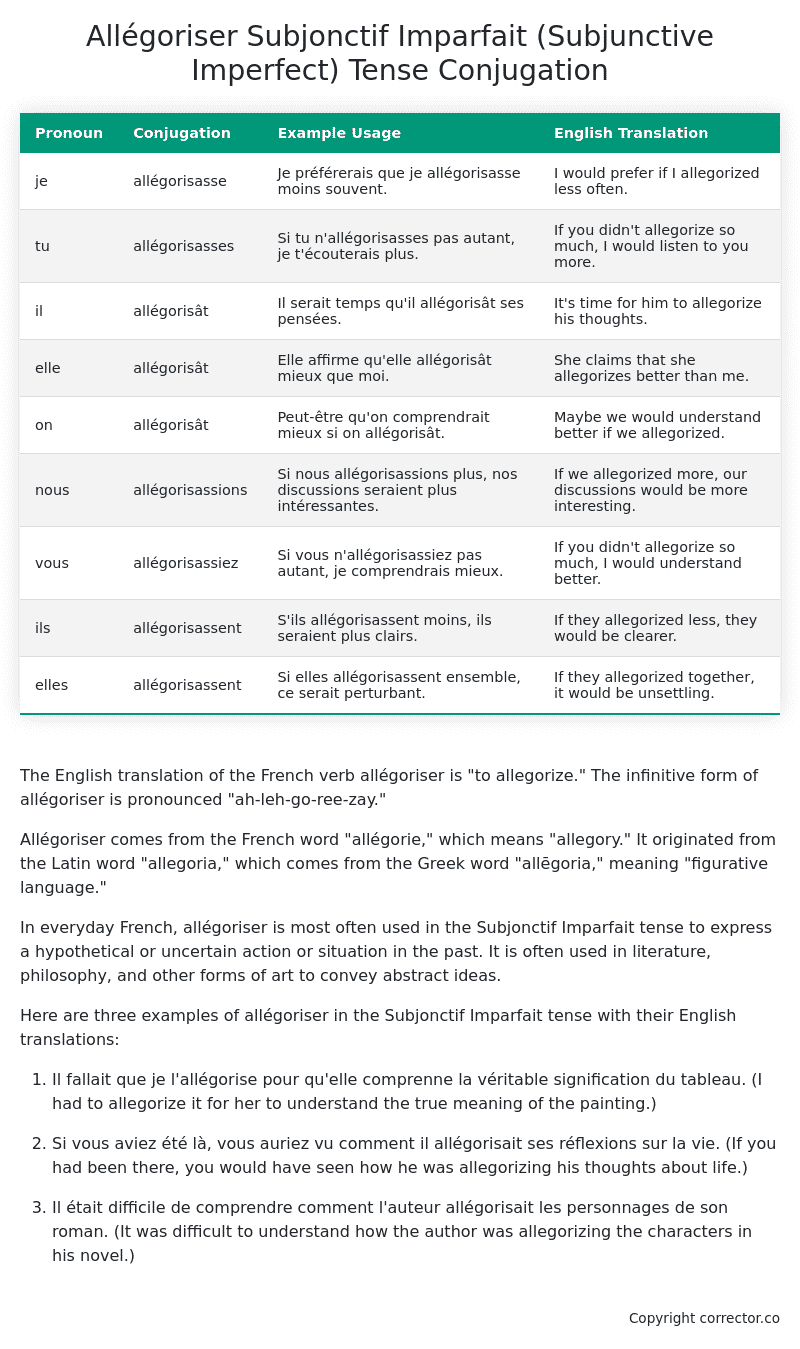Subjonctif Imparfait (Subjunctive Imperfect) Tense Conjugation of the French Verb allégoriser
Introduction to the verb allégoriser
The English translation of the French verb allégoriser is “to allegorize.” The infinitive form of allégoriser is pronounced “ah-leh-go-ree-zay.”
Allégoriser comes from the French word “allégorie,” which means “allegory.” It originated from the Latin word “allegoria,” which comes from the Greek word “allēgoria,” meaning “figurative language.”
In everyday French, allégoriser is most often used in the Subjonctif Imparfait tense to express a hypothetical or uncertain action or situation in the past. It is often used in literature, philosophy, and other forms of art to convey abstract ideas.
Here are three examples of allégoriser in the Subjonctif Imparfait tense with their English translations:
-
Il fallait que je l’allégorise pour qu’elle comprenne la véritable signification du tableau. (I had to allegorize it for her to understand the true meaning of the painting.)
-
Si vous aviez été là, vous auriez vu comment il allégorisait ses réflexions sur la vie. (If you had been there, you would have seen how he was allegorizing his thoughts about life.)
-
Il était difficile de comprendre comment l’auteur allégorisait les personnages de son roman. (It was difficult to understand how the author was allegorizing the characters in his novel.)
Table of the Subjonctif Imparfait (Subjunctive Imperfect) Tense Conjugation of allégoriser
| Pronoun | Conjugation | Example Usage | English Translation |
|---|---|---|---|
| je | allégorisasse | Je préférerais que je allégorisasse moins souvent. | I would prefer if I allegorized less often. |
| tu | allégorisasses | Si tu n’allégorisasses pas autant, je t’écouterais plus. | If you didn’t allegorize so much, I would listen to you more. |
| il | allégorisât | Il serait temps qu’il allégorisât ses pensées. | It’s time for him to allegorize his thoughts. |
| elle | allégorisât | Elle affirme qu’elle allégorisât mieux que moi. | She claims that she allegorizes better than me. |
| on | allégorisât | Peut-être qu’on comprendrait mieux si on allégorisât. | Maybe we would understand better if we allegorized. |
| nous | allégorisassions | Si nous allégorisassions plus, nos discussions seraient plus intéressantes. | If we allegorized more, our discussions would be more interesting. |
| vous | allégorisassiez | Si vous n’allégorisassiez pas autant, je comprendrais mieux. | If you didn’t allegorize so much, I would understand better. |
| ils | allégorisassent | S’ils allégorisassent moins, ils seraient plus clairs. | If they allegorized less, they would be clearer. |
| elles | allégorisassent | Si elles allégorisassent ensemble, ce serait perturbant. | If they allegorized together, it would be unsettling. |
Other Conjugations for Allégoriser.
Le Present (Present Tense) Conjugation of the French Verb allégoriser
Imparfait (Imperfect) Tense Conjugation of the French Verb allégoriser
Passé Simple (Simple Past) Tense Conjugation of the French Verb allégoriser
Passé Composé (Present Perfect) Tense Conjugation of the French Verb allégoriser
Futur Simple (Simple Future) Tense Conjugation of the French Verb allégoriser
Futur Proche (Near Future) Tense Conjugation of the French Verb allégoriser
Plus-que-parfait (Pluperfect) Tense Conjugation of the French Verb allégoriser
Passé Antérieur (Past Anterior) Tense Conjugation of the French Verb allégoriser
Futur Antérieur (Future Anterior) Tense Conjugation of the French Verb allégoriser
Subjonctif Présent (Subjunctive Present) Tense Conjugation of the French Verb allégoriser
Subjonctif Passé (Subjunctive Past) Tense Conjugation of the French Verb allégoriser
Subjonctif Imparfait (Subjunctive Imperfect) Tense Conjugation of the French Verb allégoriser (this article)
Conditionnel Présent (Conditional Present) Tense Conjugation of the French Verb allégoriser
Conditionnel Passé (Conditional Past) Tense Conjugation of the French Verb allégoriser
L’impératif Présent (Imperative Present) Tense Conjugation of the French Verb allégoriser
L’infinitif Présent (Infinitive Present) Tense Conjugation of the French Verb allégoriser
Struggling with French verbs or the language in general? Why not use our free French Grammar Checker – no registration required!
Get a FREE Download Study Sheet of this Conjugation 🔥
Simply right click the image below, click “save image” and get your free reference for the allégoriser Subjonctif Imparfait tense conjugation!

Allégoriser – About the French Subjonctif Imparfait (Subjunctive Imperfect) Tense
Formation
Common Everyday Usage Patterns
Interactions with Other Tenses
Subjonctif Présent
Indicatif Passé Composé
Conditional
Conditional Perfect
Summary
I hope you enjoyed this article on the verb allégoriser. Still in a learning mood? Check out another TOTALLY random French verb conjugation!


